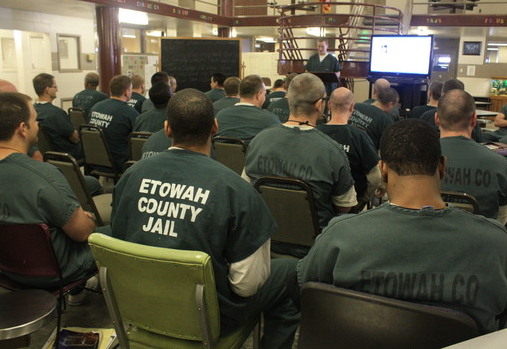
Uncovering abuse in an ICE Facility
Public Citizen’s lawsuit forced the Department of Homeland Security (DHS) to comply with the Freedom of Information Act (FOIA) and release a “super-recommendations memo” documenting abuse at the Etowah County Detention Center, a facility used by Immigration and Customs Enforcement (ICE) and located in Gadsden, Ala.
- 5 Number of groups that Public Citizen represented in the initial lawsuit
- 32 Number of months between Adelante’s request for the “super-recommendations” memo and its final release
- 127 Number of pages in the memo that documented abuses and recommendations at the Etowah County Detention Center that never were acted on
In early 2016, activist groups joined together to form Shut Down Etowah, a campaign that advocates for closing the Etowah County Detention Center. The facility was widely known for its “abysmal conditions and systemic civil rights violations” according to Jessica Vosburgh, executive and legal director of Adelante Alabama Worker Center, one of Shut Down Etowah’s campaign members.
Based on a report to Congress, Adelante learned that the U.S. Department of Homeland Security (DHS) had a “super-recommendations memo” written by the agency’s Office of Civil Rights and Civil Liberties (CRCL) that documented 50 complaints of “inadequate conditions” and made recommendations to improve the quality of the facility. In September 2016, Adelante and other immigrant and civil rights groups submitted a Freedom of Information Act (FOIA) request to get the memo.
“Etowah is the worst facility I’ve ever been at. During my time there I stayed in a urine scented, eight-person cell, where we all shared one toilet,” said Awot Negash, a former inmate at Etowah. “The people in charge at Etowah are not fit to run a jail and they don’t care about the people detained or our complaints. Nothing changes there.”
When the DHS refused to release the memo, Public Citizen filed a lawsuit in December 2017 in the U.S. District Court for the Southern District of New York on behalf of five organizations: Adelante, Detention Watch Network, Greater Birmingham Ministries, Immigrant Defense Project and Southerners On New Ground.
In February 2018, the DHS produced a heavily redacted version of the memo. Part of the redactions included the names and professional backgrounds of experts hired by the DHS to evaluate the facility. Public Citizen and Adelante asked for the court to rule in their favor and order the agency to release this information, along with other material that had been withheld.
On March 26, 2019, the U.S. District Court ruled that the DHS had to re-review the document and provide the names and professional backgrounds of experts hired by the DHS to evaluate the facility, and also required the DHS to either provide further justification for certain redactions or produce the information withheld.
The final version of the memo was released in May 2019, with fewer redactions than the original February 2018 production. Public Citizen not only was able to hold DHS and the federal government accountable but also to obtain important information for our activist allies.
In July 2019, Public Citizen dismissed the lawsuit after the DHS agreed to pay attorneys’ fees and costs.
The withholding of these records in full was plainly unlawful, and it is unfortunate that a lawsuit and court order were required for DHS to comply with its FOIA obligations.Patrick Llewellyn, Public Citizen attorney and lead counsel in the lawsuit